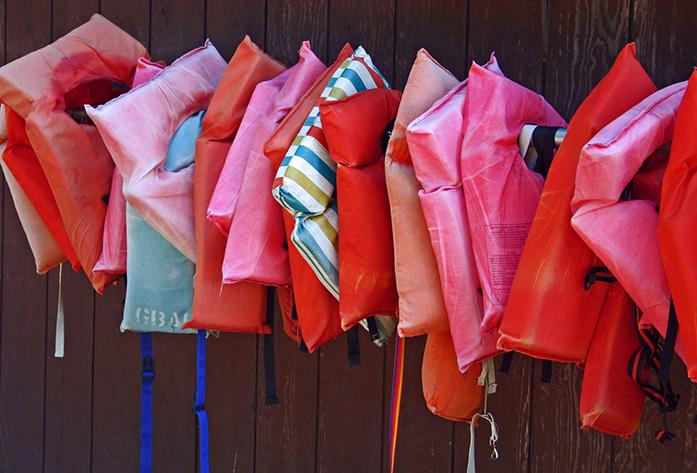By Elianna Novitch
elianna-novitch@uiowa.edu
Every day, nearly 34,000 people are forced to flee their homes because of conflict and persecution, according to data collected by the U.N. High Commissioner for Refugees.
One mode of transportation that refugees use to flee from their homes is by boat. However, these boats are often overly packed with bodies, and many fleeing for refuge don’t make it.To remember the refugees who have lost their lives traveling overseas, the University of Iowa Students for Human Rights established a life-jacket memorial on the west lawn of the Pentacrest on Wednesday.
“These people would not leave behind their homes, their families, their friends, their memories, their identities unless they absolutely had to, and to think about the sea or the ocean as your only resort is something no one could ever understand unless they were in that situation,” said UI student Hibbah Jarmakani, who works as an intern for the Iowa United Nations Association.
The Lost at Sea Memorial is a part of the Students for Human Rights’ Refugee Relief Week.
“We wanted to put on this event because a lot of the other events that were happening [during Refugee Relief Week] were more action-based, whereas this one provides a visual element,” Jarmakani said. “A lot of the time, people see gory images of the refugee situation, and they become desensitized to it, so we wanted to present it in a way that people could process.”
Along with the life jackets sits a banner that contains a quote by Warsan Shire, a Somali poet based in London, which reads, “No one leaves home unless home is the mouth of a shark.”
The goal of the memorial is to not only remember refugees who lost their lives at sea but to also raise awareness of the refugee crisis.
“The refugee crisis seems to be a very politically polarizing issue, but in actuality, it’s really just people who do not have another option who need a safe haven that we are able to provide,” said Co-President of Students for Human Rights Rebecca Howard.
Howard said some of the concerns people have surrounding the refugee crisis include security, jobs, and the economic side of letting refugees into the country.
“At the center of the issue, these are just people who have been displaced looking for another place to reside. A majority of the time, they aren’t looking to migrate,” said Co-President of Students for Human Rights Liana Suleiman. “Currently, only about 1 percent of the refugee population in the world is actively relocated, while the other 97 percent roughly live in refugee camps in or around their own countries.”
Jarmakani hopes the memorial will make people think about the refugee crisis and what they go through to survive day to day.
“When we just give numbers without attaching stories to people, a lot of times we don’t realize that these are actual humans, and we begin to just label them as refugees,” Jarmakani said. “We forget that their humans, not just refugees.
“And although the trials and tribulations that they’ll go through will always make them refugees, in the sense that they have to work harder than anyone else to survive and make it to the next day, that’s not their only characterization and we shouldn’t forget that.”



